South Australian WWII veterans Harvey Brown, Dudley Roberts and Reg Swanborough share their stories – lest we forget their heroism
More than 80 years ago, these now-wearied Diggers were idealistic young men itching to fight for their country. Now all aged over 100, they reflect on their feelings then and now.
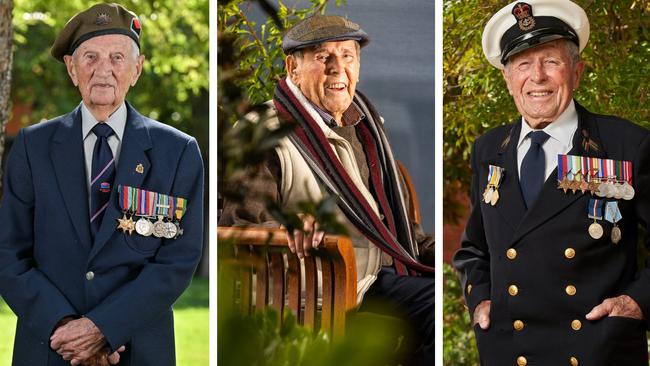
SA News
Don't miss out on the headlines from SA News. Followed categories will be added to My News.
At 18, Harvey Brown was a cheeky, charming young man and diehard Norwood Football Club fan who was itching to don a uniform and do his bit for his country.
He enlisted on Australia Day, 1942, soon after turning 19.
Initially, he served with the Citizen Military Forces in an Australian-based unit attached to the First Armoured Division’s armoured regiment. The role of the unit was to be a first responder if Australia came under attack.
“I served as a gun layer with the 30th battery of the 108 tank attack regiment … we travelled all over Australia, whenever any alarm was sounded,” says Mr Harvey, who at 100 resembles a man many decades younger and retains a mischievous glint in his eyes.
“Wherever we were needed, we’d be sent. For example, we were sent to Broome when it came under attack from Japanese fighter planes and to Sydney (when Japanese midget submarines attacked Sydney Harbour).
“Even though we were an anti-tank unit we got swapped to anti-aircraft gunners as a response to (those) Japanese air raids in Darwin and Broome,” he says.
“As a gun layer, my job was to aim the guns … I was the one who aimed the Bofors (anti-aircraft autocannon).”
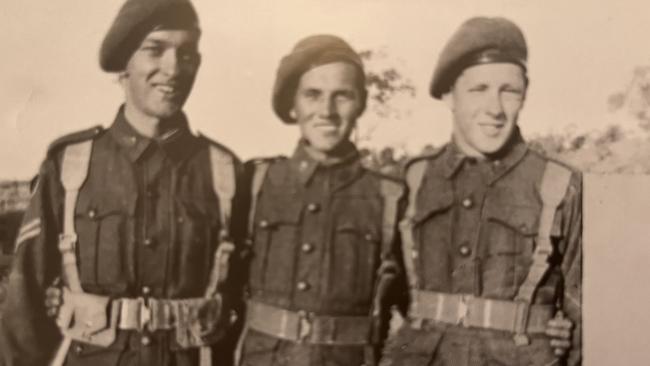
Mr Harvey, who attended Norwood primary and secondary schools, smiles widely as he shares some of the camp shenanigans.
And while you might imagine life would have been more than eventful enough for the teenager, he had other ideas, secretly yearning to be in the thick of combat action, overseas.
So he wrote to his adored big brother Len, who was doing just that, pleading for his sibling, who was six years his senior, to try to get him a spot in his unit.
“I was bored with just going around different states back here in Australia, doing the same thing day in and day out,” he recalls.
“I wrote to Len and asked him if he could ‘claim me’ because brothers could do this, which meant you might get to join their unit.
“He was in Tobruk and Syria … and then he went to Goodenough Island and I had no idea how bad it was … I just thought it would be nice to be alongside my brother, to be with him – I was pretty skinny, so I am not sure what I thought I was going to be able to do to help, maybe give him mental strength.”
But the sharp response he got left him in no doubt. His older sibling wanted him nowhere near the chaos.
“I got a letter back and he said ‘no’, along with a lot of other words besides ‘no’ … to the effect of ‘don’t be such a ‘bleeping idiot’. I’m surprised the letter didn’t burst into flames (due to the expletives it contained).”
Sadly, the effect war had on his protective big brother was obvious on his return, forever changing the sibling he’d once known, Mr Brown says.
“It absolutely changed him … he certainly liked grog and all that type of stuff more than he used to,” he says.
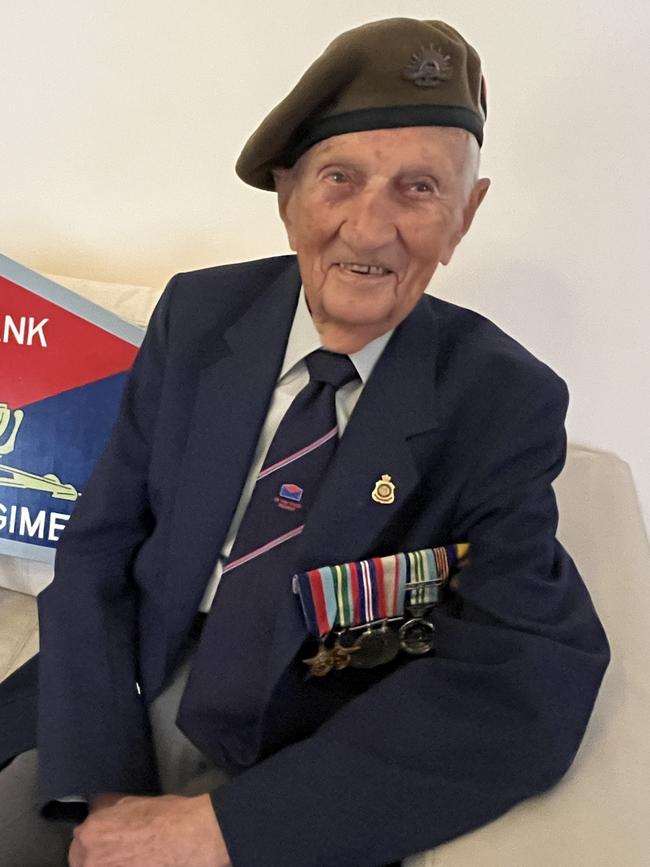
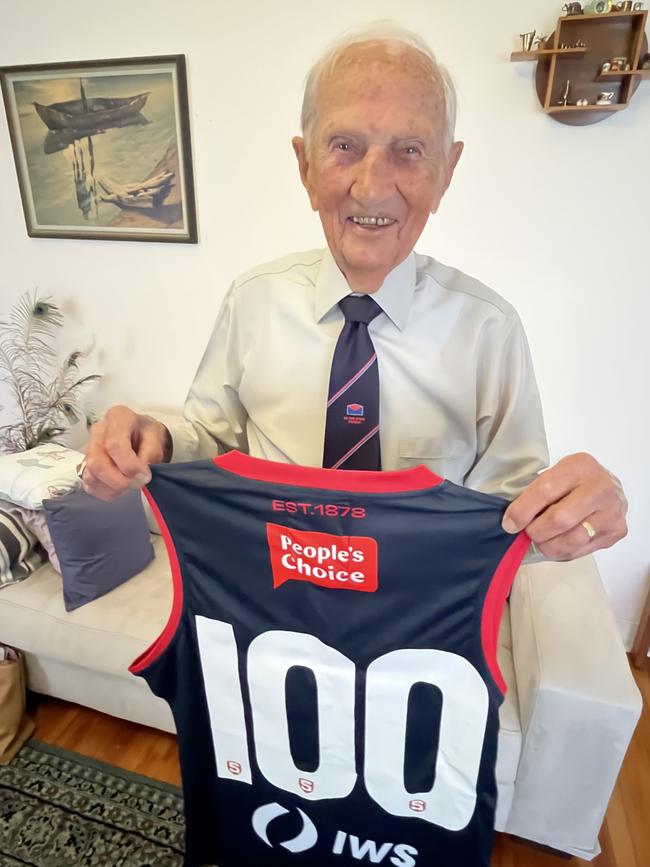
Mr Brown would finally be posted overseas, to Morotai and then Ambon, home to the notorious Japanese POW camps. “We were sent as reinforcements – three mates and myself went on one boat up to Moratai where we were for several weeks before two got sent to Tarakan and (my mate) Colin and I stayed on Morotai.
“We’d finally been made infantry when, all of a sudden, the war ended.”
Still, Mr Harvey, who had been trained in first-aid, stayed on and helped treat some of war prisoners on their release. At least, “what was left” of them, he says. “At the time, I had no idea of what those poor fellows had been through – what they’d endured.”
The proud serviceman will march this year with son Steve, granddaughter Rebecca, a police officer, and great granddaughter Cara.
“We can only hope the world never again sees a war like this because it will be worse than the last … I pay my respect to those who’ve volunteered in places such as Afghanistan – they are just incredible,” he says.
‘I’d never even been to Adelaide before’
By his own admission, Dudley Roberts wasn’t much of a scholar but the centenarian has carved a legacy that won’t be soon forgotten.
The Kangaroo Island stalwart – a soldier settler farmer – is the last surviving member of South Australia’s 2/27th Infantry Battalion.
Born and bred on the land, he grew up in Port Pirie, on the east coast of the Spencer Gulf, as one of six children – one of his siblings died as a young child – and started his school life at Napperby.
“But I failed in Grade 1, so that didn’t go too good … I later went to Port Pirie but left as soon as I could – I was 14,” he laughs, leaving the classroom to work on the family farm.
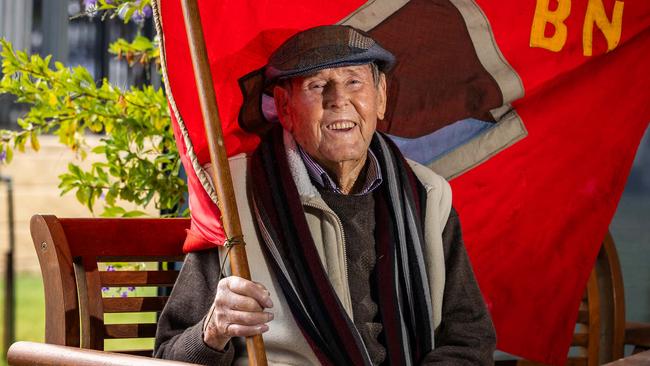
When the call-up to join the army came several years later, he quickly accepted.
“I was told I could be exempt (from service) given I was working on the farm but things weren’t so flash on the farm, so I decided I would go to war,” he says.
“Besides, things weren’t looking too good, the Japanese were threatening to invade Australia and I thought I ought to do my bit.
“So, a mate and I went down to (the city) to join up where we were told ‘we’d be sorry’ … but I thought it was a bit of an adventure, really, as I’d never even been to Adelaide before.”
He recalls letters he received abroad, including details of dust storms wreaking havoc across rural South Australia.
He would be sent to serve in the jungles of New Guinea and Borneo.
He says the only real wartime injury he sustained was self-inflicted when he accidentally cut himself with the wound turning septic.
He tells how he was carried out of the jungle by the Fuzzy Wuzzy Angels, who, he says “dropped him” when they heard a Japanese Zero fighter plane flying overhead – but still, he sings the praises of the caring carriers as well as the “miracle cure” sulfamic acid, used to treat his wound.
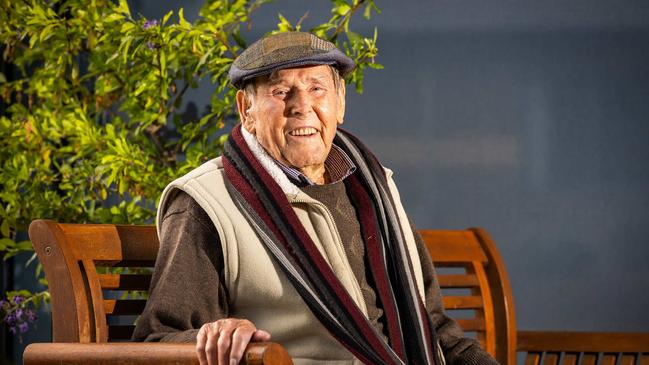
It might be eight decades on, but he still remembers well many of the young men he served with.
He grows sombre when he speaks about them and the operations such as “Shaggy Ridge” which “cost a lot of lives … before the Western Australian blokes took it over”.
“Australians, in general. were terrific soldiers and the best mates you could wish for,” he says.
“I was lucky to come home.”
While his voice stirs now with emotion as he talks about them, he says at the time you couldn’t afford to give the loss of lives too much thought.
“You were too busy just keeping your head down and looking after your own life … we just kept on keeping on as much as we could,” he says.
“But let’s hope nothing like it ever happens again.”
Mr Roberts sits for a moment in quiet reflection before beginning an earnest, emotion-filled rendition of the Ode of Remembrance: “They should not grow old as we who are left grow old, age shall not weary them nor the years condemn … at the going down of the sun and in the morning we will remember them.”
Remarkably, the battalion flag, complete with its battle scars, that flew over the headquarters of the 2/27th Australian Infantry Battalion during World War II campaigns in the Middle East and Papua New Guinea has found its way on to KI.
It will be draped over Mr Roberts’ coffin when the time comes before it will be taken to the Australian War Memorial for its final resting place.
Daughter Suzanne – one of five children, 15 grandchildren and 26 great-grandchildren – sums of the feeling on KI: “We are very, very proud of him and love him like crazy.”
‘War achieves nothing – was it worth it, all those lives lost?’
Looking down the barrel of his 102nd birthday, Reg “Swannie” Swanborough can recall with video-like precision the instant he spotted an enemy torpedo being dropped from above more than eight decades ago.
It was in July 1941 as a 19-year-old naval officer that his ship, part of a convoy headed to Malta during WWII, came under air attack from “the Germans and Italians”.
“I can recall it exactly … I was on the port side of the bridge,” he says of the hit that “blew a hole big enough to drive two double decker buses through”.
“There was a furious fight going on, all the guns were firing … the sound you wouldn’t believe, mate, it was horrendous.
“I spotted this torpedo bomber coming down through all this gunfire … saw it drop two torpedoes and I remember yelling out to the captain on the bridge, ‘torpedo dropped port side, sir’.
“I remember getting thrown up in the air and coming down that bloody hard on the deck.
“You pick yourself up and the first thing I did was blow my life jacket up; the second thing I did was light a fag – you’re not meant to smoke on duty, but under those circumstances anything goes.”
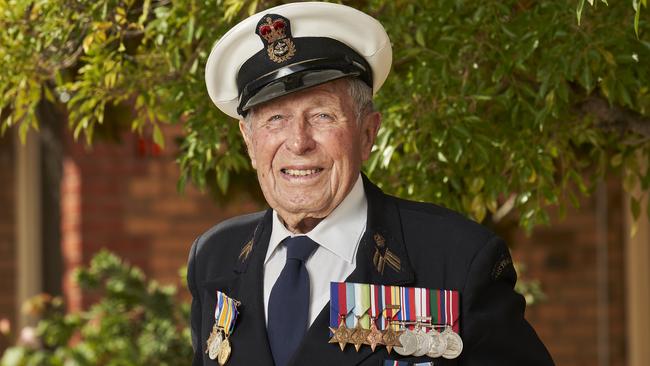
Dozens of troops on board were killed in the incident he describes as just one of many “pretty hairy” situations he found himself in.
“There were lots of frightening occasions while I served, but that was probably one that affected me most,” he says.
“You imagine how you’d feel if you survived a bad car accident; you feel grateful that you’re still alive, but you feel a bit numb.
“But I’ve been lucky, I am still alive and that is basically what it is all about … it is not easy to explain to someone who doesn’t know (what war is like) and couldn’t possibly know.”
The charismatic and endearing Englishman, who was discharged to Australia where he chose to settle post-war, was a naive 15-year-old when he joined the British Royal Navy in July 1938.
He tells how he put “the hard word” on his mother after his father, who served in World War I, died when Reg was just 14.
“I had a sense of adventure more than anything else, I didn’t have any heightened idea that I was saving the world or anything,” he says.
“I probably didn’t know what I was getting myself into, you think you’re indestructible when you are that age.”
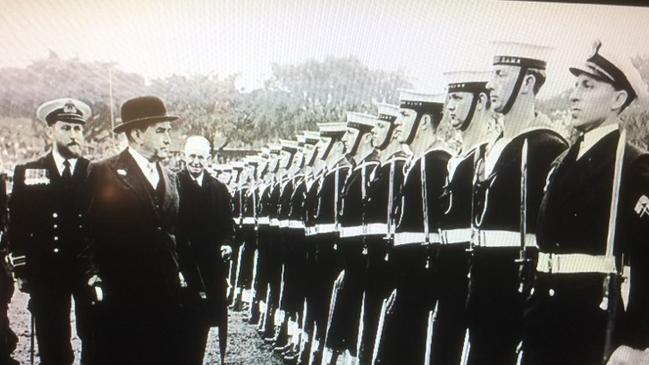
In Australia, he joined the Royal Australian Navy and rose to chief petty officer, a rank he held for 16 years.
Mr Swanborough says his Navy service shaped his life forever.
“You learn discipline; you don’t do as you please. You had to fit into that slot and you had to do your job,” he says.
While he reflects on his experiences in the Navy with a sense of gratitude, he loathes war.
“War achieves nothing … I think back over the war years, which seem a lifetime ago, and think, ‘was it worth it … all those lives lost?’. War is such a wasteful thing.”
For him, Anzac Day is a sombre occasion to “remember my mates and remember all the guys who got out there and did their best for Australia”.
“Well, mate, I think of the other boys … to the best of my knowledge of the 33 I joined with only three came home alive – myself and two others,” he says.
“A hell of a lot died … and I march to remember them.”





